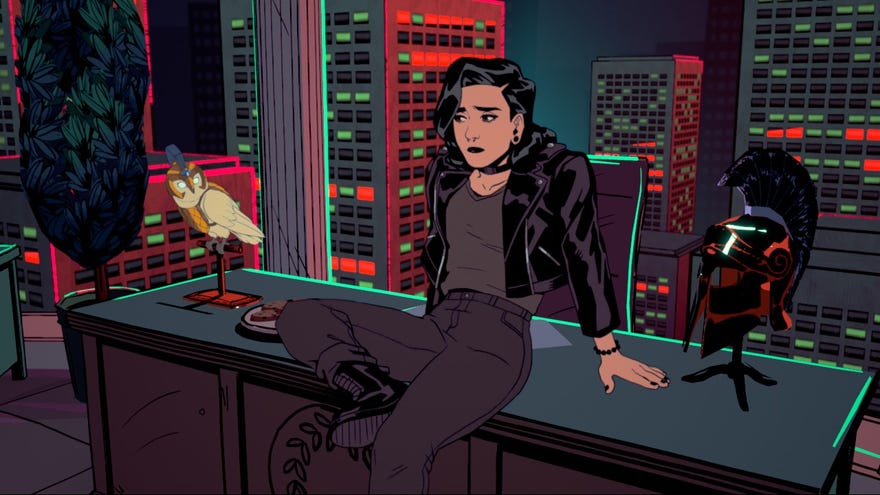Stray Gods: The Roleplaying Musical review: a melodic narrative adventure that gives you something to sing about
Hitting the high notes
Scan the cast list for Stray Gods and you may notice a fair bit of overlap with that of The Last Of Us. Both Troy Baker (Joel) and Ashley Johnson (Ellie) appear in key supporting roles here, while star billing goes to Laura Bailey, aka Abby from Naughty Dog’s sequel. Obviously, this means Stray Gods has some top-notch voice talent on board, but these casting choices also make another kind of sense. The premise of this 'roleplaying musical' is inspired by the Buffy the Vampire episode 'Once More With Feeling', you see, and as in that piece of classic TV, part of the appeal is seeing (or hearing) performers who famously earn a crust in more action-oriented roles forced to prove their singing chops instead.
Thankfully, The Last Of Us crew all have a finely tuned set of pipes on them, not least Bailey, and the notes they belt out absolutely do this game’s charming and entertaining concept justice. Even better, they’re ably backed by the admirable composing skills of Austin Wintory, a fizzy script and pitch-perfect character design.
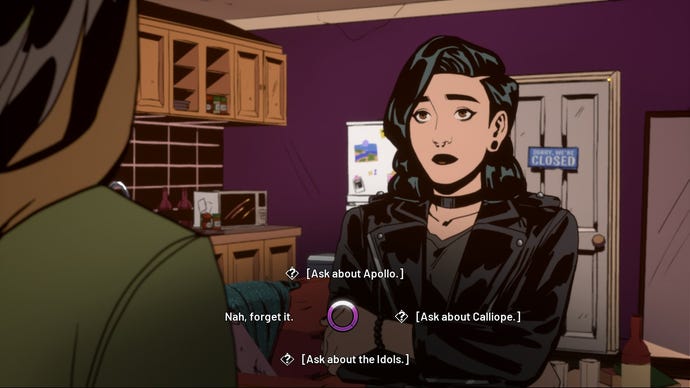
So how does a 'roleplaying musical' actually work? Well, as with any musical worth its salt, conversations in Stray Gods have a habit of turning into songs at the drop of a hi-hat. That's thanks to protagonist Grace, a young singer who's feeling lost in the world, then inadvertently inherits the power of the muse from Greek mythology. Not only does that make her suddenly immortal, but she can also now compel those around her to sing their feelings and desires - and at certain points in this narrative adventure, she does just that. The melody starts, characters set to crooning, and you intervene when prompted with choices that send the lyrics and music off at different tangents, leading to outcomes that fork the plot in various ways.
Or, to be more precise, it's the game's subplots that fork, since the main story is as set in stone as a victim of Medusa's stare. The propulsive narrative force here is an investigation, as Grace finds herself pressured by the Greek pantheon – now secretly residing in modern day America – to find out who killed her predecessor. With a trial looming at the end of the week, she either uncovers the truth, or takes the fall for the crime. So she doesn't have much choice other than to ingratiate herself into the world of the gods (who now call themselves idols) and discover what each one knows.
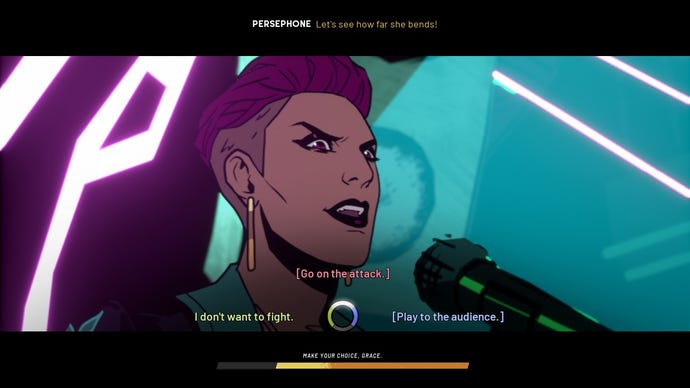
What follows is a series of scenes built up from efficiently expressive comic-panel stills, in which Grace (sometimes accompanied by her BFF, Freddie) chats to the idols in their bespoke habitats. Dialogue choices allow you to pump these NPCs for info or respond to any reticence they have in ways that might massage their egos. There are also some useful options linked to one of three characteristics you can choose for Grace near the start – charming, kick ass, and clever. Whatever your approach, you won’t fail to find the key clues that drive you to the next encounter, but how you get there and who you ally with is certainly up for grabs. Things can even get flirty with some of the cast, leading to opportunities for a budding romance. And that’s before an encounter almost inevitably breaks into song, where you’ll have the biggest influence.
It works, first of all, due to the rounded and lively characters. While Supergiant’s Hades may have stolen some of Stray Gods’ thunder with its witty, modernised take on Greek mythology, the surprisingly deep personalities on show here are equally engrossing company. The idols adhere to core traits – the goat-horned Pan can hardly suppress his hedonistic desires, for instance – but they’ve also been bent by time and a messy process of reincarnation that sees their spirits hop into mortal bodies (like Grace) where new memories fuse with the old. So we have Apollo, an open-shirted blond Adonis, cheek bones as sharply defined as his abs, reinvented as a moping surfer dude. Persephone, an intimidatingly tall mafioso queen of the dead, meanwhile, now governs a nightclub called The Underworld.
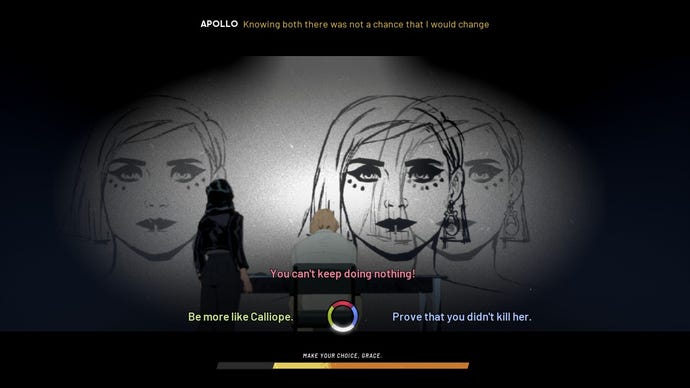
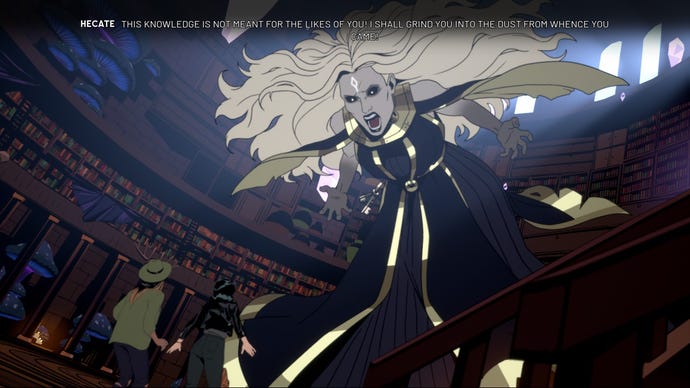
The cracks in the confident façade of this crew start to show not long after Grace is first brought before them. Some of the pantheon have drifted away over the centuries, and those that remain soon reveal themselves to be insular, broken or wracked with trauma. These are survivors of the depravity of Greek myth after all – Persephone was kidnapped by and forced to marry her uncle, Hades, for example – and the scars still run deep, alongside fresher ones inflicted by the very un-mythological horrors of history since, not least that of the 20th century. The concept of 'roleplaying' here might just as easily be applied to the positions these characters are set to fulfil for eternity, their life force draining as they do.
If that sounds dour, rest assured that Stray Gods handles big emotions and epic poem tragedies with a dignified touch, then shimmies back to mischief and humour like an especially supple salsa dancer. Conversations are snappy, with a believable rhythm, as Grace riffs off the personas of the idols with incredulity, rage and charm. If there’s any fault here, in fact, it's that the Buffy influence brings with it a needlessly large dose of those self-conscious analytical quips the show (and Joss Whedon) was famous for, which feel rather worn these days. Medusa lets slip that she's longing to taste the blood of a hero, for instance, before adding, "It's a problem. I've been working on it," when she sees Grace's unimpressed expression.
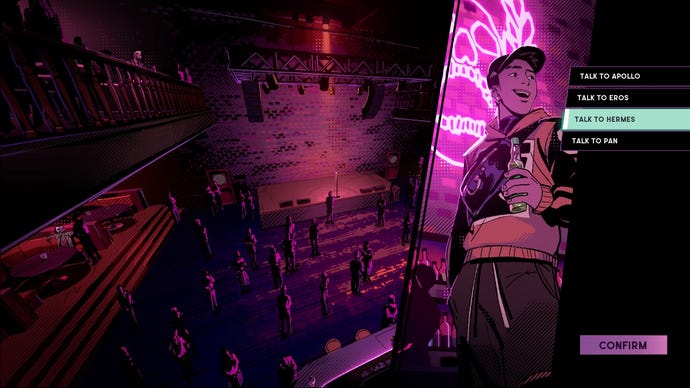
What matters most of all, of course, is the songs themselves, and they're certainly a versatile array, switching from comedic ditties to sassy lyrical battles or mournful ballads with consummate ease. Bailey and Johnson, along with Mary Elizabeth McGlynn as Persephone, display impressive vocal range, while Khary Payton as Pan steals scenes with a gravelly, soulful, scheming jazz cat style, even working a goatlike timbre to his voice. The comic highlight though belongs to Rahul Kohli as a pitiful Minotaur – the actor's, let’s say, less polished singing voice lending itself perfectly to a bashful, fumbling serenade.
The segues when you make your timed choices are as smooth as can be, transitioning into different musical territory without dropping a beat.
Naturally, the tunes mould themselves to fit, whether it's powerful orchestral arrangements to complement lung-busting solos or an injection of funk to support a rapid-fire rap. The segues when you make your timed choices are as smooth as can be, transitioning into different musical territory without dropping a beat. With that invisible magic, sometimes a song can feel like an evolving debate, with Grace and her partner alternating verses. Elsewhere, you're mediating an argument between two rivals, deciding which one gets to state their case, or you're trying to win someone over by plucking certain emotional strings. You listen, you await your moment to direct the next segment, then enjoy the result.
Having said that, however, these songs don't necessarily stick in the head once they're over. Whereas the big numbers in Once More With Feeling swim in the mind, there’s nothing quite as catchy to cling onto in Stray Gods' equivalents. In part, that’s due to their branching nature, and the lack of a single definitive version. But also, a few never climb above filler status, while others drift somewhat after strong starts. In particular, many of the compositions refuse to loop back to the original refrain, and it's thus not unusual to feel like you've ended with a different song to the one you started a couple of minutes previously.
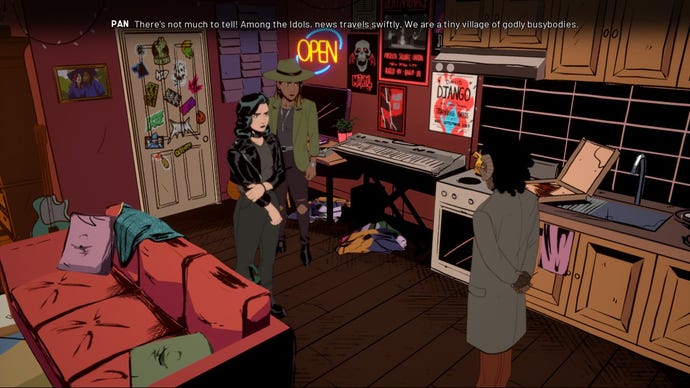
Stray Gods remains a beautifully choreographed work, though, because every element sings from the same hymn sheet. On reaching the end, I was soon tempted back in, using a feature that lets you load a save from any previous scene, wiping everything that came after so you can write a different fate. The branching relationships mean there's plenty more to see on repeat, with different endings for most characters and different songs to unveil. It also helps that you can skip through dialogue pretty quickly, since the ratio of dialogue to song leans a little heavily towards the former in the second half.
A few gripes aside, then, the 'roleplaying musical' concept has proven itself a winner here, and if Summerfall ever want to give us an encore – once more, with even more feeling? – a sequel would be wholly welcome. Plus, isn't it nice to hear those Last Of Us actors harmonising for a change, instead of pretending to kill each other?
